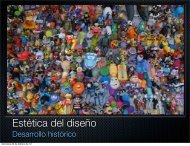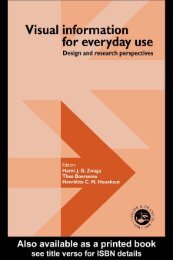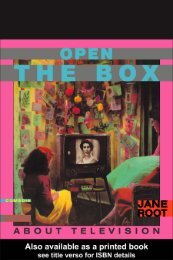Edited by Chris Jenks - carlosmoreno.info
Edited by Chris Jenks - carlosmoreno.info
Edited by Chris Jenks - carlosmoreno.info
Create successful ePaper yourself
Turn your PDF publications into a flip-book with our unique Google optimized e-Paper software.
AN INTRODUCTION<br />
Our contemporary views on epistemology were, Rorty <strong>info</strong>rmed us, shaped<br />
<strong>by</strong> a combination of Cartesian ideas concerning ‘mental substance’ and<br />
Lockean ideas concerning ‘mental processes’. Descartes’s cogito centred<br />
understanding on an independent, located and subjective mind—a finite<br />
capacity and disposition—waiting to be unified with Locke’s conception of<br />
active ‘mentalism’, or what we might describe as the practices <strong>by</strong> which<br />
we come to know. This powerful combination, that is, this now ‘active’<br />
‘mind’, was latterly situated <strong>by</strong> Kantian philosophy within a total and<br />
unified cosmos which was both organised through and knowable in terms<br />
of pure reason itself.<br />
The metaphysical questions addressing the real characteristics of the<br />
‘outside’ nature and the ‘inside’ mind were seemingly held in abeyance (or<br />
just taken for granted) and philosophy’s project became dedicated to the<br />
‘rigorous’ and ‘scientific’ divination of the accurate and most appropriate<br />
transportation of the ‘outside’ into the ‘inside’. 9 The conventional highway<br />
for this transport has been the senses, but primarily ‘sight’. Such empirical<br />
rather than intuitive theories of knowing have marked out the epoch of<br />
modernity: a period we might describe as the ‘opening of vision’.<br />
This historical scenario established an absurd dichotomy in the relation<br />
between ‘self’ and ‘other’, two moments which could now be more<br />
appositely reformed as ‘the receptacle’ and ‘the spectacle’; 10 or perhaps<br />
‘the vision’ and ‘the ultimately visual’. This scenario also fostered the<br />
emergence of the ‘mind’-less empiricism and ‘value’-less positivism as the<br />
methodological strategies that were to both dominate and, unintentionally,<br />
retard the development of modern social theory.<br />
Our contemporary realisation of this inquisitorial dichotomy between<br />
‘self’ and ‘other’ in sociological work has subsequently settled into the<br />
sanitised methodological form of ‘observation’. ‘Observation’ has become<br />
a root metaphor within social and cultural research, and an extensive<br />
vocabulary of ‘visuality’, applied in an almost wholly unreflexive manner,<br />
has become instrumental in our manoeuvres for gaining access to and<br />
understanding the concerted practices of human communities. 11 As Lowe<br />
has stated: The perceptual field thus constituted…was fundamentally<br />
nonreflexive, visual and quantitative.’ 12 The implementation of the concept<br />
of ‘observation’ in socio-cultural research, and its obvious general<br />
acceptability, are <strong>by</strong> no means accidental or arbitrary. Such usage and its<br />
institutionalisation are refinements of the conventional ‘ocularcentrism’<br />
abroad within the wider culture. 13 We daily experience and perpetuate the<br />
conflation of the ‘seen’ with the ‘known’ in conversation through the<br />
commonplace linguistic appendage of ‘do you see?’ or ‘see what I mean?’<br />
to utterances that seem to require confirmation, or, when seeking opinion,<br />
<strong>by</strong> inquiring after people’s ‘views’. (For the pedagogue such habitual<br />
interrogative phrasing can assume the form and regularity of punctuation:<br />
a habit radically, and poignantly, arrested in myown experience after<br />
3






